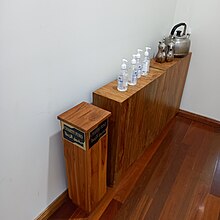
| Part of a series on |
| Mandaeism |
|---|
 |
| Religion portal |
In Mandaeism, zidqa (Classical Mandaic: ࡆࡉࡃࡒࡀ) refers to alms or almsgiving.[1][2] Mandaean priests receive regular financial contributions from laypeople, since priesthood is typically a full-time occupation. Zidqa is also offered to the poor and needy.[3]
Other uses
[edit]The Mandaic term zidqa brika (literally "blessed oblation") refers to a ritual meal blessed by priests. An early self-appellation for Mandaeans is bhiri zidqa, meaning 'elect of righteousness'.[4]
See also
[edit]- Charity (Christian virtue)
- Zakat in Islam
- Sadaqah in Islam (Arabic cognate)
- Tzedakah in Judaism (Hebrew cognate)
- Dāna in Hinduism
References
[edit]- ^ Gelbert, Carlos (2011). Ginza Rba. Sydney: Living Water Books. ISBN 9780958034630.
- ^ Drower, Ethel Stefana. 1937. The Mandaeans of Iraq and Iran. Oxford At The Clarendon Press.
- ^ Nasoraia, Brikha H.S. (2021). The Mandaean gnostic religion: worship practice and deep thought. New Delhi: Sterling. ISBN 978-81-950824-1-4. OCLC 1272858968.
- ^ Rudolph, Kurt (7 April 2008). "MANDAEANS ii. THE MANDAEAN RELIGION". Encyclopaedia Iranica. Retrieved 8 January 2022.

Well, that’s interesting to know that Psilotum nudum are known as whisk ferns. Psilotum nudum is the commoner species of the two. While the P. flaccidum is a rare species and is found in the tropical islands. Both the species are usually epiphytic in habit and grow upon tree ferns. These species may also be terrestrial and grow in humus or in the crevices of the rocks.
View the detailed Guide of Psilotum nudum: Detailed Study Of Psilotum Nudum (Whisk Fern), Classification, Anatomy, Reproduction